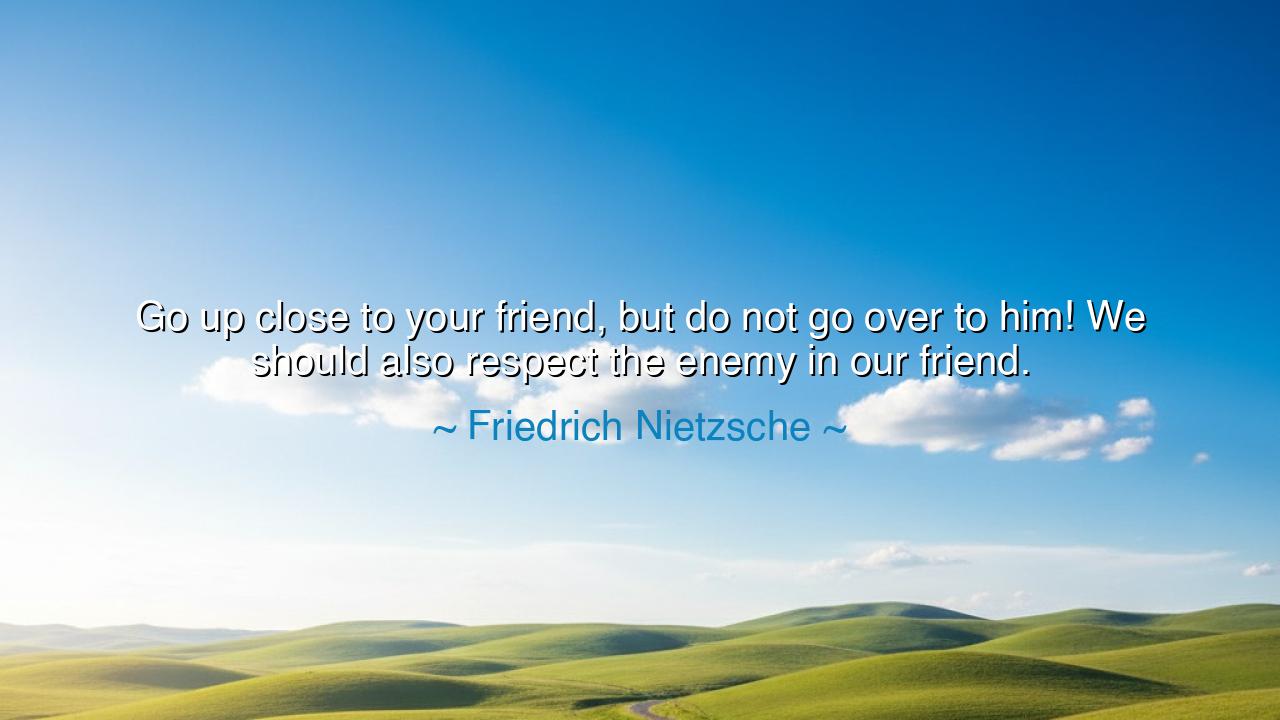
Go up close to your friend, but do not go over to him! We should
Go up close to your friend, but do not go over to him! We should also respect the enemy in our friend.






The words of Friedrich Nietzsche, “Go up close to your friend, but do not go over to him! We should also respect the enemy in our friend,” are like thunder rolling across the mountains, strange and unsettling, yet filled with ancient truth. In these lines, Nietzsche reminds us that even in friendship, there must be distance, even in love, there must be space, and even in loyalty, there must remain the shadow of otherness. For to truly respect a friend, we must not consume them nor demand they be only what pleases us. We must honor the strength in them that resists us—the enemy within the friend—which preserves their individuality, their mystery, their freedom.
To go close but not over is the essence of true companionship. Too much closeness suffocates; too much fusion destroys. A friendship without boundaries becomes dependency, and love without distance becomes possession. Nietzsche warns against the temptation to erase difference, for difference is what gives friendship its fire. When he speaks of the “enemy in our friend,” he speaks of the traits that oppose us, the will that resists our own, the tension that challenges us. It is precisely in this opposition that growth is found, for a friend who never resists you is not a friend but a shadow.
History gives us a vivid example in the bond between Alexander the Great and his general Hephaestion. Their friendship was deep, enduring, and filled with mutual loyalty. Yet Alexander, who desired to conquer the world, often faced Hephaestion’s counsel that questioned his judgment or tempered his ambition. In those moments, the “enemy” in the friend revealed itself—not out of betrayal, but out of truth. Alexander respected that resistance, for without it he would have been left to the ruin of unchecked pride. It is in the clash of wills, even among friends, that wisdom often emerges.
The ancients also honored this principle in their conception of agon, the noble contest. In Greek thought, even friendship was strengthened through struggle. Wrestlers trained together, poets competed in verse, philosophers debated fiercely. They did not demand agreement at every turn, for that would breed weakness; instead they respected the “enemy” within the bond, knowing that iron sharpens iron. Nietzsche’s words are a revival of this old wisdom: to love is not to erase opposition, but to endure it, respect it, and allow it to refine both souls.
The heart of the teaching, then, is this: never demand that a friend mirror you. Let them stand apart, with their own voice, their own power, even when it resists yours. Respect the individuality that challenges you, for it is this very difference that makes them worthy of honor. To crush the enemy in your friend is to make them a slave; to respect it is to preserve the sacredness of friendship.
The lesson is clear: true friendship requires balance, reverence, and space. Draw close, but do not trespass. Cherish intimacy, but honor boundaries. Listen not only when your friend praises you, but also when they oppose you. Do not seek to conquer the enemy within your friend; instead, bow to it, for it is the mark of their freedom. And remember: without that freedom, there is no true friendship at all.
Practical actions follow. When your friend disagrees with you, do not strike back in anger; instead, ask what truth lies hidden in their resistance. When you feel the urge to overstep, to demand, to smother, step back and remember that closeness must be tempered with respect. Nurture bonds that challenge you, not only those that flatter you. And above all, remind yourself that a friend is not a possession, but a companion on the path—a soul who walks beside you, sometimes in harmony, sometimes in tension, yet always in freedom.
Thus, Nietzsche’s words stand as a flame in the darkness: “Go up close to your friend, but do not go over to him! We should also respect the enemy in our friend.” In them lies the secret of enduring companionship, a truth as old as the ancients and as vital as the breath of life: love the friend not for their sameness, but for the strength of their difference.






AAdministratorAdministrator
Welcome, honored guests. Please leave a comment, we will respond soon